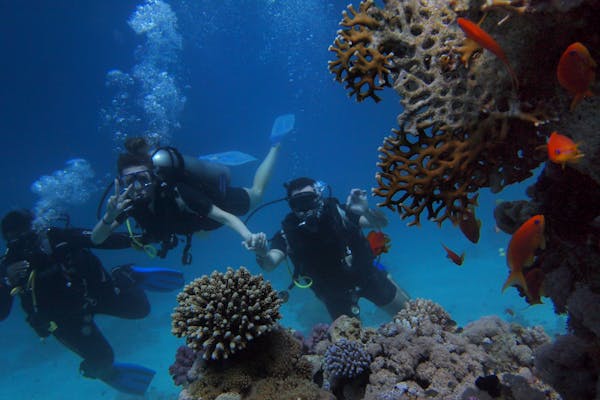The ocean covers more than 70% of our planet, but more than 80% remains unknown. Travel in the deep ocean is possibly the most thrilling scientific horizon, opening secrets of the black seafloor. With extraterrestrial-like creatures, unseen ecosystems, and potential resources, the abyssal lows conceal unseen marvels. With each improvement in technology, scientists explore deeper than ever before, uncovering astonishing finds that transform our understanding of sea creatures and Earth's geology.
The Importance of Venturing into the Deep Sea
1. Revealing Marine Diversity

The deep sea is home to some of the world's most unusual forms of life. Bioluminescent fish, giant squids, and uncategorized microbial organisms thrive in environments where no sunlight reaches. Researchers examine these creatures to learn about adaptation, evolution, and potential applications in biotechnology and medicine.
2. Discovering Geological Secrets
The ocean floor is an energetic topography of submarine mountains, ridges, and volcanic mountains. Research there advances plate tectonics, seismicity, and hydrothermal vent creation. These vents, particularly, harbor unique environments that can provide information about life on Earth as well as the possibility of life on other planets.
3. Climate Change and Environmental Monitoring

The ocean plays a critical role in climate regulation on our planet. Deep-sea currents regulate the weather, and sediments from the ocean track past climate change. The exploration of the deep ocean provides valuable information on ocean acidification, carbon sequestration, and global warming impacts.
4. Promise of New Resources
Deep beneath the oceanic surface lies a wealth of unused resources, including rare earth minerals, methanehydrates, and medications derived from deep-sea organisms. Green exploration can lead to environmentally friendly resource extraction methods that can aid industries such as renewable energy and pharmaceuticals.
Technological Development in Deep-Sea Exploration
1. Autonomous Underwater Vehicles (AUVs) and Remotely Operated Vehicles (ROVs)

While human exploration is thwarted by crushing pressure and darkness, AUVs and ROVs become crucial tools for deep-sea exploration. The robotic detectives are equipped with high-definition video cameras, sonar mapping gear, and sample collection equipment that allow scientists to chart the seafloor to an unprecedented level of accuracy.
2. Deep-Sea Submersibles
Human-operated submersibles such as Alvin and Deepsea Challenger have enabled researchers to descend as deep as 11,000 meters. These vessels make direct observation possible, allowing researchers to see deep-sea creatures and geological formations in real time.
3. Improvements in Sonar and Imaging
Multibeam sonar technology has revolutionized deep-sea mapping by the creation of high-resolution images of the seafloor. And laser and holographic imaging technology allows scientists to take close-up photographs of deep-sea life without disrupting its environment.
4. Deep-Sea Internet and AI Integration
The integration of artificial intelligence (AI) and deep-sea exploration allows for real-time analysis of data, making mapping, species identification, and anomaly detection more efficient. Underwater communication systems also advance, with more effective data transmission between the submersibles and surface units.
Challenges and Risks of Exploring Ocean Depths
1. Extreme Conditions
Deep sea is an alien environment with ice-cold temperatures, monstrous pressure, and absolute darkness. It is expensive and difficult to make equipment that will endure such a condition.
2. Prohibitive Costs of Exploration
Exploration of deep sea is expensive since it entails specialized technology and infrastructure. Compared to space exploration, which has massive funding, deep-sea research finds it difficult to acquire funds.
3. Environmental Issues
Although exploration is rewarding, it risks harming fragile ocean ecosystems. Seafloor disruption or untargeted deep-sea fishing can lead to habitat destruction and biodiversity loss.
4. Limited Human Presence
Deep-sea exploration is distinct from terrestrial or shallow-water science in that it relies heavily on remote sensing and robotic platforms. The absence of direct human presence limits the capacity to conduct real-time scientific experiments.
The Future of Deep-Sea Exploration
With growing technological advancements, possibilities for deep-sea exploration are promising. Cross-border collaborations, more investment, and AI-based research will be likely to generate new findings and efficient management of resources. Continuous observation of sea creatures and ocean dynamics through deep-sea observatories, much like space telescopes, may be possible.
Governments and organizations, such as the National Oceanic and Atmospheric Administration (NOAA) and the Schmidt Ocean Institute, are funding deep-sea research, so the mysteries of the abyss are gradually disclosed. Private organizations and donors are also getting interested in funding ocean exploration expeditions, once again driving the science at an even quicker pace.
Conclusion
Deep-sea exploration is a captivating venture that holds the key to answers for most of the unknowns concerning our Earth. From the discovery of new species and comprehending climate change to the deciphering of geological mysteries and possibly resources, the seafloor continues to be one of the final great frontiers of human exploration.
As we continue to push the boundaries of ocean science and explore, judicious exploration and conservation will be the essence of maintaining the delicate ecosystems of the deep. Through ongoing innovation and collaboration, the mysteries of the deep sea can one day be fully revealed and offer revelations that may chart the fate of science, technology, and mankind.
As we continue to push the boundaries of ocean science and explore, judicious exploration and conservation will be the essence of maintaining the delicate ecosystems of the deep. Through ongoing innovation and collaboration, the mysteries of the deep sea can one day be fully revealed and offer revelations that may chart the fate of science, technology, and mankind.







Comments(0)